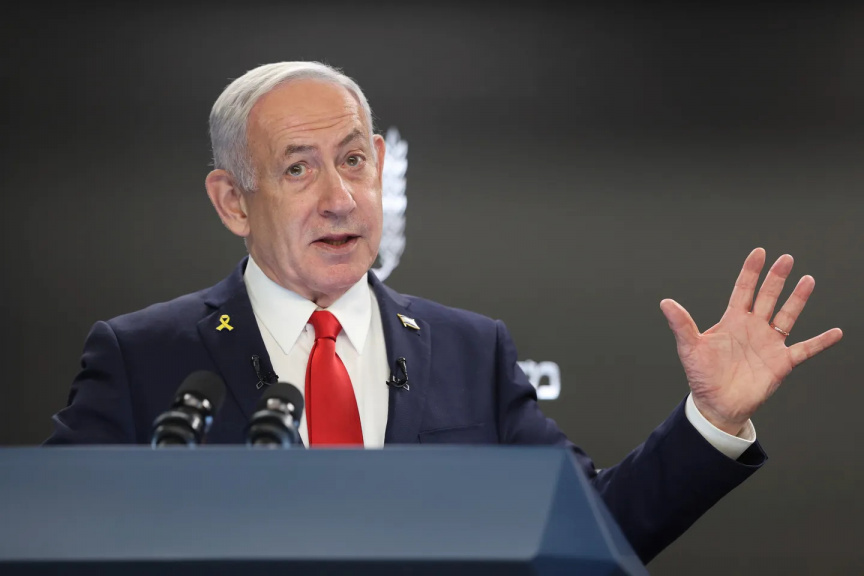
Israeli Prime Minister Benjamin Netanyahu. (Photo/AP)
Israeli Prime Minister Benjamin Netanyahu has further escalated tensions with Qatar, threatening more after Israel’s latest attack on Doha targeting Hamas officials.
"I say to Qatar and all nations who harbor terrorists: you either expel them or you bring them to justice. Because if you don’t, we will," Netanyahu declared in a video address defending Tuesday’s attack in Doha targeting Hamas leaders.
I say to Qatar and all nations who harbor terrorists, you either expel them or you bring them to justice. Because if you don’t, we will pic.twitter.com/nlYa7r1OPi
— Benjamin Netanyahu - בנימין נתניהו (@netanyahu) September 10, 2025
The Israeli attack — an unprecedented one on a Gulf state — reportedly hit multiple offices within Hamas’s Doha headquarters.
While none of the group’s senior political figures were killed, Hamas confirmed the deaths of five lower-ranking members, including the son of Khalil al-Hayya, the group’s leader in Gaza and its top negotiator, as well as three bodyguards.
Netanyahu’s justification
In his remarks, Netanyahu likened Hamas’s October 7, 2023, blitz to the September 11, 2001, attacks in the United States, which Washington used as a pretext to launch its so-called “war on terror.”
"What did America do in the wake of September 11? It promised to hunt down the terrorists who committed this heinous crime, wherever they may be," he said, accusing Qatar of financing and sheltering Hamas leaders "in mansions."
"We did exactly what America did when it went after al-Qaeda terrorists in Afghanistan and when it killed Osama bin Laden in Pakistan," he argued, adding that countries applauding the US then "should be ashamed of themselves" for condemning Israel now.
Israeli President Isaac Herzog echoed the defence, telling the Daily Mail in London that Israel targeted al-Hayya because he was obstructing a US-backed ceasefire and hostage release deal.
"He kept saying 'Yes, but' in negotiations," Herzog said.
Netanyahu has been accused of obstructing truce talks, even by hostages families.
Qatar, along with Egypt and the US have played a central role in mediation, and Hamas delegations regularly travelled to Doha and Cairo during truce talks.
Qatar pushes back
Qatar swiftly denounced Netanyahu’s comments as "reckless" and "explicit threats of future violations of state sovereignty."
The Foreign Ministry said in a statement that hosting Hamas’s political office in Doha was part of internationally recognised mediation efforts "requested by the United States and Israel" to secure prisoner swaps and ceasefire agreements.
Statement | Qatar Strongly Condemns Statements by Netenyahu Regarding the Israeli Attack on Qatar#MOFAQatar pic.twitter.com/64u2ukWt5X
— Ministry of Foreign Affairs - Qatar (@MofaQatar_EN) September 10, 2025
"Netanyahu is fully aware that the hosting of the Hamas office took place within the framework of Qatar’s mediation efforts requested by the United States and Israel," the ministry said.
"Negotiations were always held in an official and transparent manner, with international support and in the presence of US and Israeli delegations."
The statement dismissed Netanyahu’s comparison to post-9/11 counterterror actions as a "misleading and desperate attempt" to justify aggression.
It added that Netanyahu’s remarks reflected "a person who relies on extremist rhetoric to rally votes while facing international arrest warrants and deepening global isolation."
Qatar vowed to continue its mediation role "as a trusted international partner" but said it would take "all necessary measures" to defend its sovereignty and work with allies to "ensure Netanyahu is held accountable for his reckless and irresponsible actions."
Doha also called on the international community to reject what it described as Netanyahu’s "incendiary, Islamophobic rhetoric" and efforts at "political deception" undermining peace initiatives.
Fallout and implications
The strike marked one of Israel’s boldest moves since its genocide in Gaza began in October 2023.
Hamas said it would not alter its decision-making in response.
"Israel’s crimes will not affect the leadership’s decisions nor our coordination with other factions," senior Hamas official Husam Badran said.
The targeting of Hamas’ leadership in Qatar came as mediators — including the US, Egypt and Doha — attempted to salvage a ceasefire and hostage exchange proposal.
Critics warned that the attack risks unraveling talks.
Netanyahu’s defiance, however, suggests he is seeking to reframe Israel’s aggression as part of a broader fight against terrorism, even at the risk of diplomatic confrontation with a key Gulf mediator.
Qatar, which has long maintained open channels with Hamas, now finds itself directly in Israel’s crosshairs, raising fears of regional escalation and complicating already fraught ceasefire diplomacy.
___
Source: TRT